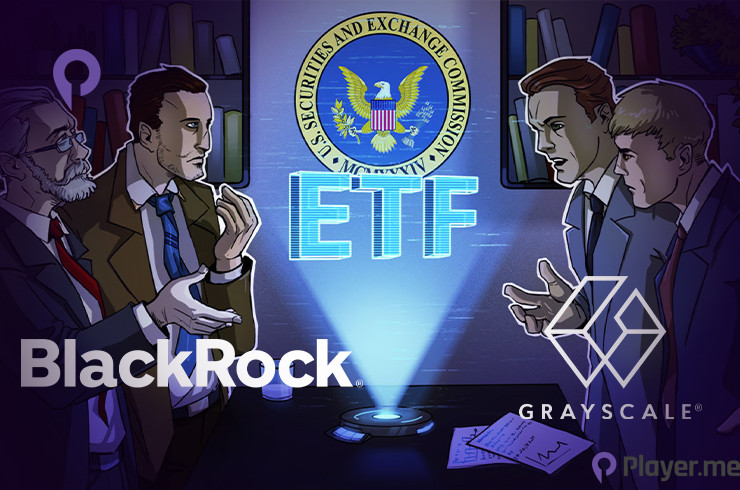The U.S. Securities and Exchange Commission (SEC) is currently engaged in intensive discussions with major asset managers, setting the stage for a potentially groundbreaking decision on approving a Bitcoin Exchange-Traded Fund (ETF). Recent memos released by the SEC shed light on crucial meetings with industry leaders, such as Grayscale and BlackRock, indicating a shift in crypto regulation and raising anticipation within the crypto community.
Also Read: 5 Takeaways From America’s Crypto Industry Biggest Crackdown in History
Engagement with Grayscale: A Legal Triumph with Ongoing Implications
The SEC’s memo discloses a meeting with Grayscale on November 30, focusing specifically on the potential conversion of the Grayscale Bitcoin (BTC) Trust into an ETF. This is a noteworthy development, considering the SEC’s previous opposition to such a move. However, Grayscale successfully challenged this decision in court, leading to a legal victory and prompting renewed discussions with the regulatory body.
Grayscale’s legal triumph reflects the changing dynamics of regulatory engagements. It signals a potential precedent for other crypto asset managers seeking similar approvals. The ongoing implications of Grayscale’s victory reverberate through the industry, offering hope to those navigating the intricate process of obtaining regulatory approval for cryptocurrency-related financial products.
BlackRock and Nasdaq Meetings: Technical Details Take Center Stage
In a separate memo, the SEC reports discussions with BlackRock and the Nasdaq representatives on November 29, highlighting the granular technical details being explored. BlackRock, a major player in the asset management industry, had filed for a BTC ETF in June, along with several other firms.
The depth of discussions with these key players suggests a shift from initial concerns to a comprehensive examination of intricate technicalities, marking a positive step toward potential ETF approvals.
The involvement of Nasdaq in these discussions underlines the collaborative effort between traditional financial markets and emerging digital assets. The detailed exploration of technical aspects signifies a move beyond mere regulatory hurdles, indicating a concerted effort to create a framework that aligns with industry requirements and investor protection standards.
Also Read: European Crypto ETP Inflows Rise After Blackrock Bitcoin Filing
Growing Confidence Amid Pending Applications
The crypto industry is closely watching the SEC’s interactions with these major players as thirteen firms, including Grayscale Investments, BlackRock, Invesco, and ARK Investments, await decisions on their pending ETF applications. The regulatory body’s historical reluctance to approve crypto ETFs has led to cautious optimism within the industry.
While the SEC retains the authority to block these funds, the growing confidence in the market stems from the belief that regulatory barriers are gradually being dismantled. Industry experts speculate that the launch of crypto ETFs in the U.S. could become a reality early next year.
The potential approval or denial of multiple applications simultaneously could be a strategic move by the SEC, streamlining the regulatory process and establishing a precedent for future crypto financial products.
Also Read: Franklin Templeton Files for Spot Bitcoin ETF
Gensler’s Influence and Industry Adaptations
Gary Gensler, the Chair of the SEC and a known critic of cryptocurrencies, plays a crucial role in these deliberations. Despite his scepticism, recent public statements indicate a willingness to consider his staff’s input on a potential BTC ETF. This shift in tone from the SEC Chair aligns with the broader industry trend of adapting to regulatory expectations.
Grayscale made a strategic move to hire John Hoffman, a seasoned Invesco ETF executive. The appointment signals a commitment to adhering to regulatory requirements and a readiness to navigate the intricacies of the ETF launch process under new leadership.
Impact on Bitcoin Prices and Investor Confidence

The increasing confidence in the market regarding the potential approval of a BTC ETF has had a tangible impact on BTC prices. From a late-summer low of approximately $26,000, BTC’s value surged above $37,000. This suggests that investors view the prospect of a regulated investment product, such as an ETF, tied to the spot price of BTC as a positive development.
Proponents argue that an ETF, a regulated product, offers investors the best way to access and invest in BTC while meeting the necessary investor protection standards.
Also Read: Bitcoin (BTC) Amazing Reign in Cryptocurrency Market Dominance Records a 2-Year High
Addressing Substantive Details
After the legal victory for Grayscale, the SEC’s focus has shifted towards substantive details typically discussed in the latter stages of an ETF application process. These details include custody arrangements, creation, and redemption mechanisms, and investor risk disclosures. The fact that the SEC is engaging in discussions on these intricate aspects signals a move towards addressing the core operational and risk management components of potential ETFs.
These substantive discussions not only indicate a potential approval but also highlight the maturation of the crypto industry. As regulators delve into the operational intricacies, crypto asset managers are forced to refine and solidify their structures, which could have far-reaching positive implications for the industry.
Balancing Innovation and Regulation
Amid the optimism surrounding potential ETF approvals, challenges remain, with one of the significant sticking points being the settlement mechanism — whether issuers will opt for a cash settlement or an “In-kind” settlement mechanism. The SEC’s hesitancy to comment publicly on individual filings makes the final outcome uncertain.
The challenge lies in balancing fostering innovation and adhering to established regulatory standards. The choice between cash and “In-kind” settlements presents distinct implications for market dynamics and investor experience. The resolution of these sticking points will likely shape the trajectory of crypto ETFs and influence the regulatory approach to future financial products in the digital asset space.
In-Depth Meetings and Accelerated Information Requests
Memos released by the SEC provide a glimpse into extensive engagements with executives from major firms, including BlackRock, Grayscale, Invesco, and 21 Shares. These in-depth meetings, sometimes extending to Chair Gary Gensler’s office, signify a departure from routine engagements with lower divisions of the SEC.
The acceleration of information requests from the SEC, from a frequency of every few months to every week, reflects a thorough evaluation process. As discussions advance, issuers update their filings to incorporate new details, indicating a dynamic regulatory environment that responds to real-time industry developments.
Legal Landscape and Grayscale’s Precedent
The legal landscape, shaped by the federal appeals court’s ruling on Grayscale’s ETF application, sets a precedent that limits the grounds on which the SEC could reject similar filings. The court’s decision establishes a framework for evaluating future applications, potentially providing issuers a clearer path forward.
The industry’s confidence in addressing market manipulation concerns through surveillance arrangements with listing exchanges and Coinbase further strengthens the case for ETF approvals. The evolving legal landscape and industry efforts to enhance surveillance and compliance measures create a foundation for the SEC to potentially greenlight ETFs without compromising investor protection.
Also Read: As Retail Flow Shifts to Coinbase, CryptoQuant Reports Decline in Binance’s Bitcoin Reserves
Final Say
The potential approval of bitcoin ETFs could redefine investor access to the cryptocurrency market, bridging the gap between traditional finance and digital assets. The evolving dynamics, accelerated discussions, and the potential for multiple approvals signify a transformative period for the crypto industry. These will also open new avenues for investors and shape the future of digital asset investment.
The relationship between regulatory developments and market dynamics suggests a maturing crypto community gaining acceptance within traditional financial frameworks. As the SEC navigates the balance between innovation and regulation, the outcome of these discussions could set the stage for a new era in the integration of cryptocurrencies into mainstream investment portfolios.
You Might Also Like: Financial Analyst Jim Cramer Acknowledges Mistake, Encourages Investing in Bitcoin for Those Who Appreciate It.
Author Profile
Latest entries
 GAMING2024.06.12Top 4 Female Tekken 8 Fighters to Obliterate Your Opponents in Style!
GAMING2024.06.12Top 4 Female Tekken 8 Fighters to Obliterate Your Opponents in Style! NEWS2024.03.18Elon Musk’s SpaceX Ventures into National Security to Empower Spy Satellite Network for U.S.
NEWS2024.03.18Elon Musk’s SpaceX Ventures into National Security to Empower Spy Satellite Network for U.S. GAMING2024.03.17PS Plus: 7 New Games for March and Beyond
GAMING2024.03.17PS Plus: 7 New Games for March and Beyond GAMING2024.03.17Last Epoch Necromancer Builds: All You Need To Know About It
GAMING2024.03.17Last Epoch Necromancer Builds: All You Need To Know About It





